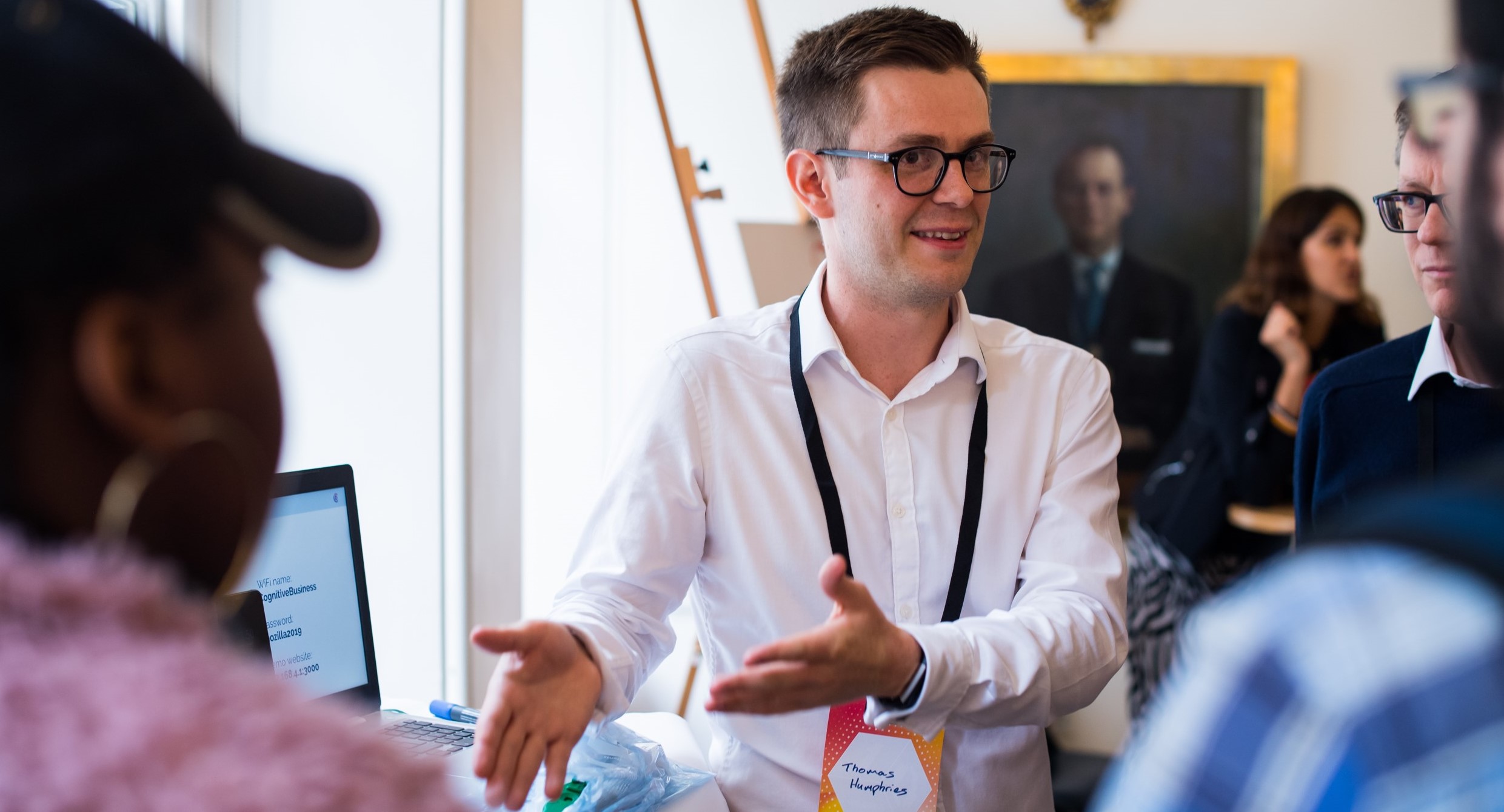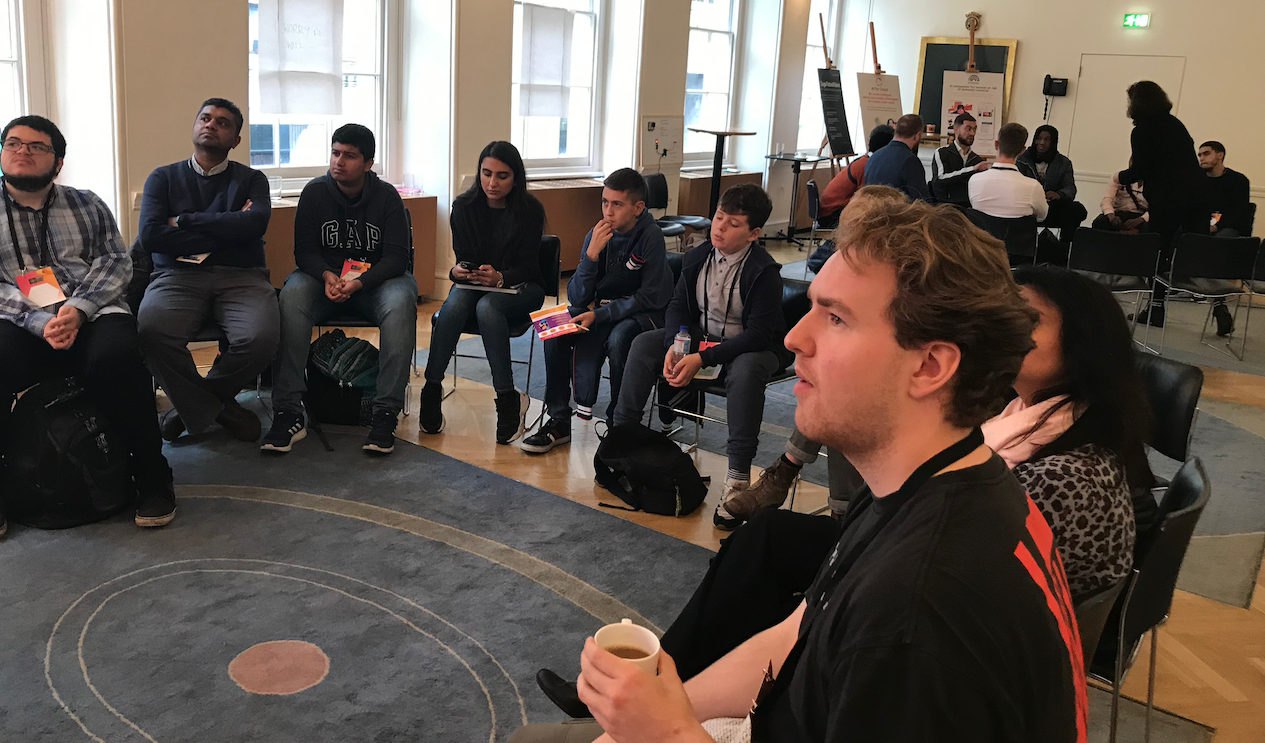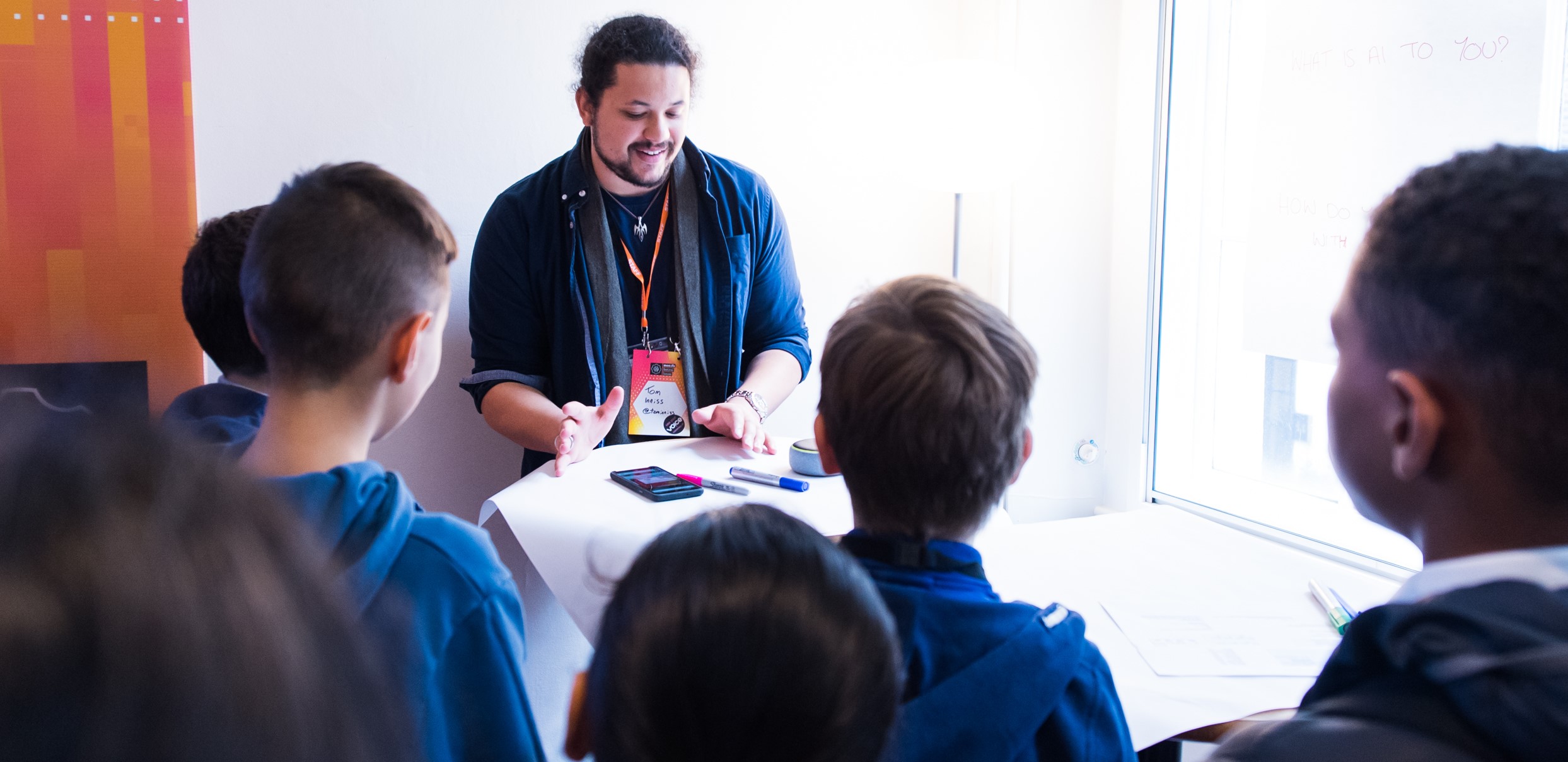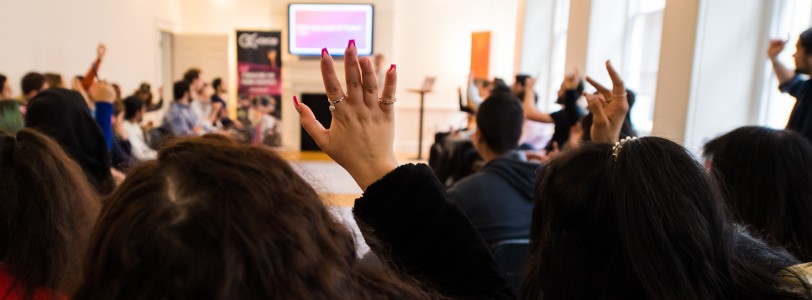Taking place in the Royal Society of Arts where a plethora of MozHouse workshops were hosted throughout the week, we met with 50 young people to discuss a pertinent issue of our time: Artificial Intelligence.
Professor Robin Moore, Head of Innovation at the BBC, gave an opening presentation on Artificial Intelligence. He defined the difference between traditional programming and the contemporary phenomenon of machine learning. Whereas traditional programming instructs a computer by hard coding behaviour as a set of commands, machine learning involves teaching computers by way of examples, allowing the computers to lean via algorithms. Moore also introduced the main advantages and disadvantages of AI, with benefits in spheres such as healthcare and transport, but downsides present when it comes to trying to eliminate gender and racial bias.
Following on from this introduction, the young people experienced an array of AI demos. From BBC Datalab to the impact of AI in the world of creativity, the young attendees were able to encounter AI in practical and useful methods and see how it might make a positive impact on their lives. You can read what Paddy thought about the demonstrations here.
Our full list of Demos were:
Ethi - Control of all your personal data in one place.
Ethi is building a tool to help you take back control of your personal data, making it easy to reclaim, control and use your personal data. We'll demo a platform which shows analysis and visualisations of our Facebook data. We will be discussing the purpose of the overall project and explaining how we keep personal data secure. We think Ethi might be the route to ethical and user-controlled research, advertising and personal AI, and that's just the start.
AI for Good - Intelligent, ethical and scalable technologies for a better, fairer world
A social enterprise applying AI to tackle some of the toughest humanitarian challenges. On a small mission to help 100 million vulnerable people, we build ethical AI products that people really like and that address their most pressing needs including the need to sustain our planet.
FutureMakers - AI + Creativity education course available to all
Workshop series aimed at preparing young people for jobs that don’t exist yet by bringing together AI + creativity - learn more about this opportunity with the folks from AI for Good.
rAInbow - Preventing domestic abuse and violence
Powered by AI, rAInbow provides a non-judgemental and safe environment to prevent and detect early signs of abuse. You will get to see the app and discuss how it might affect society more broadly.
BBC Datalab - Personalised experiences at the BBC
The BBC Datalab team works on providing personalised experiences to audiences across BBC online products though data-driven recommendations. The key feature of Datalab’s approach is the development of machine learning algorithms together with Editorial colleagues to create relevant, diverse, compliant to BBC values, and engaging recommendations for all audiences, with now a specific focus on younger audiences. We will share our approach and outcomes from our work, discussing the importance of responsible approaches to machine learning, specifically in the case of recommendations.
Personal Assistants - What can they do and how should we use them?
Voice Magazine team members experiment with the requests and consider how we’ve been adopting ‘personal assistants’ in to our every day lives, but what risks do we open ourselves up to?
Cognitive Business - Using AI to enhance renewable energy resources
Cognitive Business are transforming the operation and management of renewable energy sources and businesses with the help of AI. Their work with wind power means more potential for clean energy with no extra turbines needed! Join Cognitive to explore sensors and how AI is being used to help.
Creative Applications - Is this real?
Join us in determining what is real or fake; can composite images really look like real people that don’t exist? Or can AI power help you make your own Bach music? Our interactive test cases will help us discuss the issue of fakes in society and consider how technology can lead to more creativity.
NESTA - Longitude Explorer Prize
We would like to live in a world where people can live longer, live better, live together, and live greener. Can you create or improve a product, app or service that uses AI technology to make the world a better place? Find out more about being a part of or supporting this exciting opportunity for 11-16 year olds with the ultimate chance of winning £25,000.
From demo to discussion
After getting hands-on with AI and machine learning, participants then engaged in a series of discussions around privacy, algorithms, society, and what the future looks like with AI in our lives.
Ethi led a discussion around what AI means for humans, including the risks and the possibilities of AI knowing you. The young people thought that AI could positively:
Prevent loneliness in the population
Engage people who are alienated in society and build a sense of belonging
Teach and pass on information
Be a friend for people who need reliable and consistent companions.
On the other hand, Artificial Intelligence may:
Create over-reliance
Control emotions and create negative social influence
Expose privacy
Create an echo chamber
Sabotage humans because it doesn’t have a moral compass
Misunderstand human needs and values
Discriminate.
The young people gave palpably enthusiastic responses, and whilst they were clearly aware of the potential benefits that AI could have on humans, they also recognised the risks of AI knowing us and our data too closely.

The BBC then set a discussion around how algorithms impact on our lives and how we feel about this. NESTA capably facilitated this and the young people told us that the advantages of algorithms include that they:
- Create efficiency in the workplace and save time
- Benefit the lives of elderly people, through products such as Alexa
- Made life easier and simpler.
However, the disadvantages of algorithms are that they could:
- Create echo-chamber which negate pluralism and lead to a polarisation of opinion
- Have huge political implications
- Can trace behaviours and track your searches
- Lead to a lazy/less knowledgable population, by using products such as Google Maps
- Make people addicted
- Don’t always provide reliable or truthful information
- Limit freedom of knowledge
- Create a de-humanisation of socialisation
- Be biased
- Reinforce gatekeepers at “the top” wrestling for power.
Young people are well-versed in the impact of algorithms. From social media to studying, algorithms impact us on a day-to-day basis. Arguably, although algorithms do have the potential to create a simpler life for us, the young people see them as a threat to freedom of information and partly to blame for political polarisation.

Here at Voice, we led the third discussion around the career world, asking: what is the future of work in a world of AI? The attendees thought AI should be introduced into the workplace because AI might:
- Reduce the stress an over-worked generation
- Reduce the working week to 4 or 3 days
- Promote equality in the workforce
- Lessen the power of the “gatekeepers” and managerial staff
- Create a democratic work environment
- Reimagine the workforce.
Nonetheless, they also thought AI has disadvantages in the workplace because AI may:
- Takeover the less-skilled or manual jobs first, disproportionately affecting different sections of society
- Benefit those at “the top” rather than all social classes
- Create a radical social and economic change at an extreme pace
- Bring bias into the workplace
- Negatively affect the jobs of those in the creative sector
- Create laziness and over-reliance on technology.
Attendees certainly recognised the possible positive impact of AI on the workplace. This was somewhat tempered by the idea that AI may takeover lower-skilled and manual jobs and create bias in the workplace. The room was evenly split on whether AI would benefit or disadvantage our future jobs.

Other thoughts on AI
Throughout the day, young people were also asked to comment on a variety of questions surrounding the nature of AI, what it may achieve in the future, and its potential impact on the next generation. Here's some of the top answers.
The young people said they would like technology to enable them to…
- Achieve more by putting in less labour in a shorter period of time
- Find out about things they care about and want to learn more about
- Make life more comfortable
- Live a healthier life
- Help with responsibilities
- Live life more conveniently
- Keep connected with loved ones
- Be more efficient.
The attendees commented they hope AI will…
- Make people happy
- Work on our behalf
- Not be biased
- Eliminate illnesses
- Try to help solve climate change
- Make business more efficient
- Help people live healthier lives
- Create a safer world
- Develop in the interests of the public.
The young people worry that AI will…
- Control humans through predicting motives and actions, which has been empirically negative
- Take people’s jobs away
- Complicate people’s lives
- Spread misinformation
- Take away the hope in society
- Be too invasive
- Manipulate people.
The young people think that the skills employees will need in the future include...
- Working with AI
- Good contextual knowledge
- Hands-on vocational skills
- Computing knowledge
- Digital literacy
- Empathy
- Coding.
This workshop was an opportunity for young people to develop their opinions and learn about what the future might look like through sharing views and experiencing AI hands-on. For more perspectives, here's what Rishi had to say and Paddy too.










It was such a great day and I'm glad we uncovered so much!